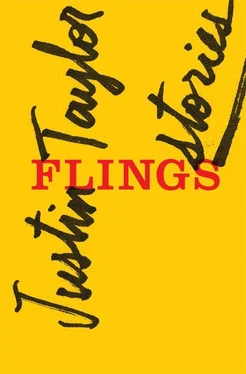Mike Beckstein’s in his kitchen, sitting at the small round table, drinking a glass of organic, pulp-free orange juice, idly regarding but not precisely looking at his MacBook. Ken and Angie, his grown son and daughter, are in their respective childhood bedrooms, going through their closets and drawers. It’s the last week of December — and good riddance, as far as Mike’s concerned; ’09 was a shit year. Come spring he and Miranda are selling the place — thus completing, finally, their divorce settlement — so the kids have to decide what’s important enough to keep and what can be thrown away, which so far seems to be pretty much everything.
There are three tabs open in Firefox and a to-do list in an unsaved Word doc. Behind those windows, and therefore at the moment entirely hidden from view, his desktop wallpaper is a photo from the 2007 Masters of himself with defending champ Phil Mickelson — who later that same day would surprise everyone by blowing his opening rounds and nearly getting cut.
Ken, shouting down the hallway: “Why does every trip down memory lane seem to end at the city dump?”
Angie, calling back to her brother: “Maybe if American childhood consisted of more than collecting every last Beanie Baby and fucking baseball card…” This comment not explicitly a dig at Mike — though not explicitly not a dig either — just the words of a hard-nosed progressive reduced by present circumstance to her inner pissed-off teen. And it’s true that the only thing the kids remember about most of this stuff is buying it: the jolt of commercial desire followed by the soft shock of success as the parental wallet opened — and then the getting bored. A long day of Internet price checking — Mike’s job, hence the tabs and list — has yielded little. All this stuff really is junk: the small black-eyed bears forlorn in their Ziploc baggies; a Mike Piazza rookie in a plastic screw case; all five installments of DC Comics’s “limited edition” Zero Hour series, each issue in its own polymer sleeve with white cardboard backer. The complete set, mint condition, on eBay right now, is going for ten bucks. Now the Piazza card, on the other hand, might have been worth some real cash if it had been mint — and a Bowman instead of a Fleer, but what can you do? Not like they need the money. But it would’ve been — what? Validating, somehow, and a nice surprise if even one of these things had paid out.
Anyway, it’s about time to knock off and hit the road. They’ve got tickets to go see the kids’ favorite group, the Phish, play the first of four concerts at the Miami Arena — technically American Airlines Arena now, but Mike prefers the old name, just as he’ll always think of the stadium where the Dolphins play as Joe Robbie, not Pro Player or Sun Life or whoever owns the naming rights for next year.
Angie — who lives in Brooklyn — insists that she be the one to drive. “Gotta get the practice when I can,” she says, and Mike could make this into a thing about how if she came home to visit more she would have more chances, etc., but that’s one conversation he doesn’t want to get into without an exit strategy, besides which she’s not wrong about the practice thing, so here he is riding shotgun in his own champagne-colored Saab.
Ken says he doesn’t mind sitting in back.
Mike, catching a glimpse of himself in the side-view mirror, stops to take a good long look: close-cropped salt-and-pepper hair — well, mostly salt these days, but still thick, and wavy if he’d ever let it grow out; nose getting a little bulbous, old-man-ly; not too many lines on his face at least, except around his eyes or when he smiles wide, a rare enough occurrence; the eyes themselves pale blue and chilly, almost alien, exuding calm power. Self-assurance. A self-made man. A wealthy man. A real estate lawyer, B.S.D. at a premier firm, with two grown children who have largely forgiven what he did to their mother, wearing a two-hundred-dollar knit pullover with the sleeves pushed up to the elbows, a modest gold link bracelet on the wrist of one hairy well-toned arm.
This used to be an open neighborhood, but a couple years ago the community board got a measure through the city council to wall it off and put up a guard gate — inconvenient, but great for property values — which means there’s only one way in and out, which means that Angie will have to drive past the old Rosen house, which happens to be on the street where the gate is. Mike himself drives past it every day, so it’s no big deal to him. But the kids? They were fifteen and sixteen when Brad — a neighborhood boy, Ken was friendly with him — cut his own throat in his backyard with a kitchen knife. There was more to it than that, but the details are vague to Mike now. An article in the Herald had speculated about a “black magic” angle, that the kid had been attempting some kind of heavy metal voodoo Satanist — well, he doesn’t remember what the claims were, and anyway that’s all they ever were: Claims. Rumors. Busybody chatter. Some hack columnist clawing his way onto A1. One line from the piece that’s always stuck with Mike: “A stunning tragedy that has shaken this close-knit, well-off community to its core.” Not to suggest that Mike thinks money can stop bad things from happening, but in his heart of hearts he might believe it should.
Ken is twenty-five now; Angie’s twenty-six. They’re what in the old days were called Irish twins — eleven months between them, though they were a grade apart all through school, which Mike believes was for the best. Their mother was less sure. Where Mike always feared the kids in competition, Miranda saw lost opportunities for camaraderie. Doing their homework together, standing up for each other. All water under the bridge now, ancient history, dust in the wind — Mike tries to think of another cliché and can’t. No matter, point’s made, and all that stuff about Brad Rosen is no less ancient, no less blown away.
“So you guys psyched for the Phish?” Mike asks.
“It’s ‘Phish,’ Dad, not ‘the Phish.’” That’s Angie chiding him. How many years have they been correcting him about this and it still won’t stick?
“He does it just to bug you,” Ken says from the backseat. Mike smiles and shrugs noncommittally. It’s not true, what Ken said, but he likes the idea. Ken and Angie love their Phish like they love few other things in this world. He likes them himself, well enough anyway, not that he ever plays their music at home. What he likes is seeing his kids together, enjoying each other’s company, sharing a common interest — all that hokey shit that when you get right down to it really and truly is what it’s all about. Family time’s not been easy to come by of late. Mike knows he’s not blameless, as far as that goes, but he also doesn’t blame himself for taking what he can get — these primo tickets, for example, the way he dangled them out before his kids like fruit. They spent Thanksgiving with their mother in Tampa so they’d be free to spend New Year’s week with him.
They’re passing the house now, though the Rosens themselves haven’t lived there in — he isn’t sure of that either, but let’s say nine years. Nobody says anything but the kids’ heads both turn so Mike looks, too, though at first he’s looking at them looking rather than at the house itself. The living room curtains are open and the lights are on. People sitting at a table in the dining room, two adults and two kids: a girl who might be seven and a bibbed toddler wriggling in a booster seat. Through a doorway on the right side of the dining room you can see into the kitchen with its small round table. It occurs to Mike that the floor plan of the Rosen house is a mirror image of his own house. Which is itself truly nothing special since every house in the neighborhood is one of four designs (eight with the reversed versions included) but still — to have never noticed such a thing before.
Читать дальше












